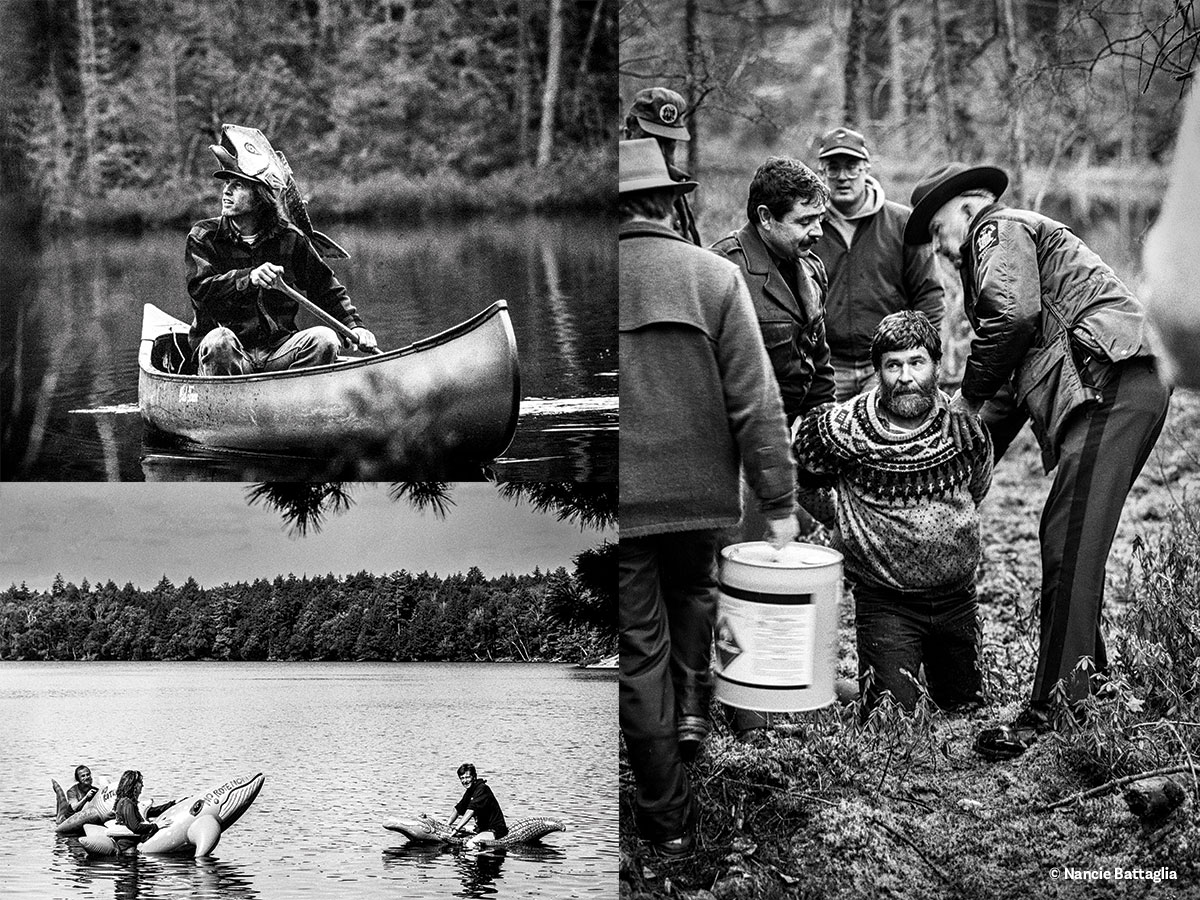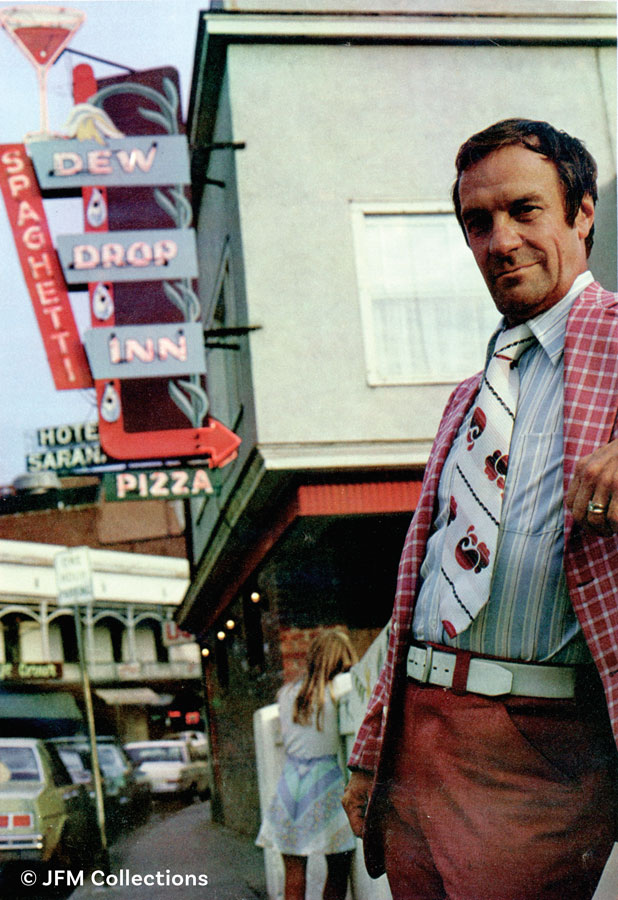Throughout 2019, in celebration of Adirondack Life’s 50th anniversary, we’re sharing an article per week from our archives—one for each year since 1970. In 1976, frequent contributor Kathryn E. O’Brien recounted the tale of one of Warren County’s most notorious outlaws, Sam Pasco.
He was taller than average, as though he competed with the pines of his native Northwoods or the high peaks of the Adirondacks that he knew so well. His muscles were hard from use, like those of the wild creatures who foraged and fought for food; and his will to survive equalled that of a twisted tree clinging to a rocky, wind-swept cliff. Violence was his teacher, and he was an apt pupil, terrorizing an entire area of Warren County, New York, for more than 30 years. He was known widely, but not well, as Alvin (Sam) Pasco, and the terms “bad man” or “outlaw” were frequently added for further distinction.
In 1872, when he was born, the upper reaches of Warren County were populated by descendants of those hardy pioneers who had migrated from the New England States, or who had come down from Canada to settle where land was readily available and fish and game abundant. There were still the vast, trackless forests, slowly bowing to the lumberman’s axe, but there were also small towns teeming with activity—towns like Stony Creek which, in 1870, had three times its present population. The frontiersman explored the land, often exploiting it for quick gain, then passing on to other sites. Hard-working farmers tried to make an adequate living from the soil’s meager resources; the more enterprising formed an elite of mill or tannery owners and mine operators. Into this life of toil, competitiveness and frequent violence came Alvin Pasco.
Some refining influence must have entered Sam’s life at an early age: it is said that he never lied, smoked, drank, or swore, although his other offenses against society more than filled the void. When he was 16, his mother died, leaving an emptiness that could not be filled. Between him and his father, Leander, there seems to have been little rapport; the evidence suggests that over the years Sam developed a low opinion of his father. There was also a daughter, Mattie, who grew up and married Joseph (called “Cal”) Wood. Alvin, growing up, somewhere acquired a wide knowledge of evil, shed the name Alvin, and became Sam.
Cal Wood, Sam’s brother-in-law, was a man of smouldering temper whose resentments ran deep. His special target was his father-in-law, Leander Pasco—who, he charged, stole nuts from his wagon-wheels, took his potatoes and, worst of all, broke up two geese sitting on eggs. Leander retaliated with some charges of his own. In the latter part of the last century, the site where two roads crossed in the Town of Stony Creek was called Creek Center. Here stood a store or two, an undertaker, a hotel, a blacksmith shop, a tannery, a saw-mill, and the court where local justice was dispensed. In May 1890, Cal Wood and Leander Pasco appeared before the Judge, each seeking a warrant for the arrest of the other. The request was denied and both departed—Cal to sulk and fume over the wrongs visited upon him by Leander, the older man to pick up an axe head and tacks at the store, passing the time of day with some of his cronies.
When Cal came upon his brother-in-law, Sam, at the Center, he found someone not only willing to listen to his grievances but ready to add some observations of his own. In fact, it may have seemed to Cal that Sam’s ideas outdistanced his, encompassing as they did the extermination of Leander—and the sooner the better. Cal concurred, but the question now became, which one of the conspirators should do the deed?
Local legend has it that Sam suggested drawing lots with the winner doing the shooting. Cal agreed. The lots may have been two straws, or a hand of poker; the medium does not matter. The fact remains that two lives hung on the outcome of a simple contest—a contest which Cal won. He did not know that in winning, he would lose everything, including his life.
At 5 in the afternoon Leander Pasco started up the Aller Wood Road toward his home. The umbrella he had carried all day was now open to ward off the spring drizzle. At about the same time, Cal, too, started off in the same direction, ostensibly heading for his home, a log house on a logging road parallel to the Aller Wood Road. Shortly after 5 on that day, shots were heard in the vicinity, but then shots were always being heard, so the incident caused no comment.
A flash photograph taken before dawn the next day shows the body of Leander Pasco, found on the road where he had fallen forward into the folds of his umbrella, killed by a blast of buckshot. The evidence was obvious, the motive well-known, and Cal Wood was found guilty of murder. Two years later, he earned the unenviable distinction of being the first man from Warren County to die in the electric chair.
Now, no longer hindered by his family, Sam Pasco was free to pursue his varied career. In his better moments, that meant acting as guide for the hunters who came up from the city for the fall season. He was also in the lumber business. Many residents of the area dealt in lumber, but Sam devised rules and ethics of his own. If he saw on someone’s property a straight, tall tree that looked right for cutting, he would try to strike a bargain with the owner. If the owner agreed to sell, Sam would pay the amount asked; if the owner refused to talk business, Sam would cut the tree anyway. By the time the tree was cut and ready for the mill, Sam could challenge the owner to pick out his lumber from all the res—which, of course, the defrauded party could rarely do. Few persons would complain to the authorities about Sam’s highhanded tactics. The man was a dead shot, possessed an imposing 6 feet 5 inches or more of bone and sinew, and was so powerful that he could cut and load a huge tree without assistance. Occasionally, there were those who flatly refused to agree to Sam’s proposals, and disasters visited them—mishaps which circumstantial evidence laid at Sam’s door. For example, one owner of some fine market logs refused to do business with Sam. Mysteriously, his barn caught fire, destroying the barn, the summer’s hay, and his farm implements. Sam himself was known to declare that he could be a good friend, but a bad enemy.
The county officers—sheriff, undersheriff, and deputy—were concerned but baffled by the vast North Woods into which the culprit vanished whenever the law came close, reappearing only when the search for him was over. Inevitably, Sam Pasco won a measure of respect, not for his deeds but for his daring; his skill with a rifle became legendary. To the apprehensive farmers, there was a certain excitement in knowing that Sam might descend upon them at any time, either as an unexpected guest for supper, or as a ruthless businessman, making outrageous demands.
The excitement of Sam’s presence extended to the children of the town. An elder citizen recalls playing in his front yard as a boy and hearing Sam come down the road, alternately talking to his oxen and bellowing out his favorite song, “In the Days of Old and the Days of Gold.”
“He knew we liked to hear him sing,” recalls the man, “and he made it a point to sing when he went by our house.” Another man with boyhood memories of Sam tells of the neighborhood children climbing on his ox-drawn load for a ride to the village store, where Sam bought candy for everyone. “Sam always had money,” the man recalls.
Were people afraid of Sam Pasco? One retired farmer now in his 80’s a former neighbor of Sam’s, scoffs at the idea, but a bright little senior citizen holds the opposite opinion. When she was 16, she worked as a waitress at the Stony Creek Hotel, where Sam came frequently. “He was always neatly dressed,” she remembers, “and never used the coarse language so many did, but I was always afraid of him. I never knew just why—perhaps it was the stories they told about him. He often ate at my home,” she went on, “but he never brought his gun into the house; he said he was afraid the children might get hurt with it.”
Sam’s colorful and unpredictable personality, along with the stories told about him, made him famous over a wide area. In Stony Creek, he was pointed out to visitors, along with the Hotel and other points of interest. No one was ever lukewarm about Sam: he was an individual who stirred up strong, but conflicting emotions. Those who got along with him would offer the opinion, “Sam’s a good fellow if he likes you.” Someone in the opposite camp would snarl vehemently, “Sam Pasco’s like a rattlesnake. Just don’t stir him up if you don’t want him to strike.”
In spite of the opposition he aroused, Sam had staunch friends, and it seemed he would go on indefinitely making his bizarre business deals. The law finally caught up with him, however, and he was convicted of stealing lumber from Lewis Everts in Thurman. He was sentenced to 10 years in prison, but the court offered to suspend sentence if the culprit would leave the county in ten days and remain away for ten years. It was a generous offer, but the persona non grata would have none of it. He squared his drooping shoulders, picked up his rifle, and paraded the town to show his contempt for the law. He deliberately overstayed his ten days and wandered down to Glens Falls. Re-arrested, he was sent to Clinton Prison at Dannemora to serve the ten years previously imposed. Meanwhile, his attorneys made constant efforts to get his sentence reduced, and in mid-January 1918, he was released, having spent between five and six years in jail.
Some years previously, Sam had bought a half-interest in a farm known as the Grimes place; the other half of the property was owned by his first cousin, who was the wife of Orlie Eldridge, a hard-working and responsible farmer. During Sam’s stay in prison, Mr. and Mrs. Eldridge, with their seven children, had moved into his former home, settling down to what they hoped would be at least ten years of peace and hard work.
Then the gates of the prison sprang open and Sam was released. Surprised to find his old home occupied, he went to the house of a neighbor on the farm adjoining his and discussed the situation. “I think I’ll let them stay until fall,” the neighbor remembers Sam saying. Sam then went to Patten’s Mills in lower Warren County and obtained work hauling out lumber, legally.
For a while, Sam followed a conventional life, but it was not in his nature to endure a steady job very long. Neither was it characteristic of him to tolerate a situation he did not like, and he did not like this one. April 1918, came; the United States was at war on the side of the Allies, and Sam was ready to begin his private war. After walking off the job, his first step, amounting to a declaration of war, was to call at the office of the Warrensburg News and order a notice published, forbidding anyone to trespass on his property at Thurman. This accomplished, his next step was to arm himself.
The latter was easily accomplished, for nearly everyone in the area owned at least one rifle which he could be persuaded to loan. The home of Jim Maxim was in the vicinity of the Pasco-Eldridge farm, and there Sam went. Maxim was at home, although, if he had been away, the outcome would probably have been the same. Sam spied Jim’s Winchester hanging on the wall and took it down with a brief explanation, “I want to borrow this, Jim,” and left.
Ever since word had come of Sam’s release from prison, the Eldridge family had lived with a fear that ranged from uneasiness to panic. Now, as a hard fist banged on the door and a loud voice roared, “Orlie, come out here,” they froze.
Slowly, Orlie unlocked the door and, his face ashen, stepped out to meet his fate. His wife followed, holding the baby; the other children huddled together for protection. There were halting explanations made to this hard-faced, gun-carrying giant with wild, dark eyes that held no glint of mercy. Delivering his ultimatum, Sam waved his gun in the direction of the open front· door. “Back in the house,” he ordered Mrs. Eldridge and the children; and, to Orlie, “You—get.”
With one backward glance to make sure his family had gained the house in safety, Orlie started up the road, the nerves at the back of his neck taut, anticipating a shot. No shot came, and when he had made the turn in the road, he started running. Stopping now and then to catch his breath, he finally reached the home of Deputy Sheriff Truman Smith in Athol. Exhausted, Orlie poured out a breathless story of Sam’s persecution. The deputy heard the story through, then went to the telephone.
“This is a job for the State troopers,” he told Orlie, and gave the number of the Warrensburg Barracks to the operator. State troopers? Orlie wasn’t sure he wanted them. The New York State Constabulary had been founded only the year before, primarily for the protection of rural areas, and they still had to prove their value to the upcountry people. Many in these same rural areas looked upon the coming of the troopers as a threat to their way of life. Fiercely proud of their independence, they had always settled their arguments themselves, and bringing an outside force into a family quarrel was unheard of. Now, too desperate to object, Orlie heard the deputy relay his story to someone at the Warrensburg Barracks ten miles away. He hung up the receiver.
“They’ll be right up,” the Deputy told Orlie, “but there’s only two of them.”
The mounted troopers rode in at midnight and although there were only two of them, Herrick and Kelley, they radiated the confidence of an army. Accompanied by Orlie, they rode on to his home where they stabled their horses and spent the night.
As soon as it was daylight, they walked down the road and knocked on Maxim’s door. Jim Maxim answered their knock, looking like a man who hadn’t slept all night, and responded to their questions evasively. Under pressure, he admitted that the wanted man was inside and allowed the troopers to enter; Orlie elected to remain outside. They found Sam, rifle in hand, standing in the doorway of a bedroom. Somewhere, perhaps in prison, Sam had learned the fine art of diplomacy. He listened patiently while Herrick and Kelley delivered Eldridge’s complaints, and agreed to talk matters over with him; yes, he might even sell his half-interest in the farm to the Eldridges. Questioned about the gun, Sam said that it belonged to a fellow down the road and he intended to take it back to him.
Outside the house, the meeting between Sam and Orlie seemed amicable enough, and the two men started up the road toward the Pasco-Eldridge house for further discussion, the two troopers following. No warrant had been issued, no arrest made, and if the rattlesnake was rattling, no one heard it.
Suddenly, for no apparent reason, Sam’s temper reached the explosion point. Without warning, there was a sudden blast from his rifle, and Eldridge fell into Kelley’s arms, gasping, “He’s got me.” The bullet, striking him on his right side, had glanced upward, coming out near the heart. He died soon after.
Slowly, Sam backed down the road, eyes and rifle steady on the troopers. Their revolvers were ready, and when he jumped into the thicket edging the road, they fired. An answering shot from Sam’s rifle went through Herrick’s coat. The murderer had now gained the comparative security of a swamp, in terrain he knew well. Both revolvers spoke, and the troopers saw Pasco stagger slightly as he disappeared into the woods. For the time being, they gave up the chase: a murder had been committed and the coroner must be called. One trooper went to the home of a neighbor who had been roused by the sound of gunfire and enlisted his help.
As soon as Dr. Goodman, the coroner, had viewed the body, the neighbor hitched up his team and, loading the remains of the murdered man into a hay-filled wagon, returned Orlie Eldridge to his anguished wife and frightened, sobbing children.
An account of the murder appearing in the April 25, 1918, issue of the Warrensburg News, expressed the outrage and shock felt by the people in the area: “Alvin Pasco, known as Sam, whose vicious and revengeful nature and lawless acts have for 30 years made his name a terror in his native town of Thurman and gained him a well-earned reputation as a bad man throughout Warren County, at an early hour Friday morning committed his crowning act of infamy when in that place he shot with a rifle Orlie Eldridge, a poor, hard-working farmer who was the father of seven children ranging in age from one to 18 years.”
A murderer was at large, and soon posters appeared bearing Sam’s picture with the words “Wanted Dead or Alive.” Headquarters sent four more men from Troop G to assist Herrick and Kelley, and they arrived with 30-30 carbines on their saddles. The local people were startled when they saw the artillery, personnel, and bloodhounds that accompanied the manhunt. There was still some pride in a native son—even a murderer—who could outwit the authority of the law, and the townspeople stayed clear of the search. Rain had fallen and the bloodhounds had to be returned to Great Meadow Prison at Comstock—new evidence that Sam Pasco bore a charmed life, that he would get out of this scrape as he had escaped the penalty for others.
The murder had taken place on April 19, and for the next ten days, the troopers and local officials searched every haunt known to Sam Pasco. They called at the homes of his numerous relatives and questioned persons known to be on friendly terms with him. One day during the search, two troopers rode up the long hill to the house owned by Fannie Reynolds (said to be Sam’s aunt), a place where he was always welcome. Without stopping to admire the magnificent view of Crane Mountain, the officers dismounted and knocked. The woman who responded to their knock answered their questions readily: No, she hadn’t seen Sam; he must be in another part of the country by now. Yes, of course, they could look around the house. A search of the rooms revealed nothing.
When the search party was safely down the hill, the fugitive emerged from his hiding place in the cellar. This and similar stories have been told over and over, and with each telling, the legend of Sam Pasco grows a little larger.
An elderly lady who remembers the ten-day search recalls that Sam obtained food at the homes of several residents who were friendly to him. “No one would refuse to give Sam a meal,” she says. At one home, a woman fixed over an old coat for him, for the spring nights were cold; another resident gave him dressings for his wound.
“They never would have found Sam if somebody hadn’t told,” insists Sam’s old neighbor.
On April 29, the Troopers received a tip that Sam was getting food after dark at the home of Enie J. Hewitt, who lived about two miles from The Glen. A note, said to have come from Mrs. Hewett, had been secreted in a pail of salt borrowed by a young relative, who carried it to the sheriff. Now the law was closing in on Sam.
On the evening of April 30, 1918, Sam came once more to the Hewett house, where, according to one who knew him, he assisted Enie with the milking. The chores finished, both men went to the house for a late supper, Sam leaving his rifle in the barn. There are those who disagree on the latter point, arguing that Sam, a man whose life was at stake, would have kept his rifle close at hand at all times.
Quietly, in the darkness of the spring night, a party of State Police and local law officers surrounded the house. Capt. Dutton was in charge of the State force, which included Sgt. Sheehan and Troopers Ryan, Kelsey, Myers, Richter, and Herrick. Warren County Sheriff Charles Baker led the local officers. Concerned for the safety of the Hewetts, each man obeyed strict orders not to move. If Sam had a rifle, those lying in wait realized that he knew how to use it.
Inside the house, Sam, well-fed and content, sat discussing his uncertain future with Enie. Finally, he said he would go out for a little air, opened the door and stepped into the woodshed. Hewett followed, holding the lamp high, and in its glow, the taller figure was outlined.
“Put up your hands,” came a sharp order from the darkness. Sam turned as if to flee; a shot barely missed Hewett. As the fugitive sprang toward the house, several rifles blazed and he fell, mortally wounded but still strong enough to shout, “Don’t shoot again; I’m done for, all right.”
They carried him into the house and called Dr. Goodman in Warrensburg, who came by automobile as soon as possible. All marveled at the strength of the man who now lay bleeding internally. One of the shots fired by the troopers ten days before had struck him in the back, followed a rib around his side, and had come out through his stomach, but the wound was almost entirely healed.
Sam Pasco lived until 10 the next morning, surrounded by the troopers, the doctor, several local officers, and his old friend, Sheriff Baker. He may have detected an undercurrent of sympathy in those who awaited death with him, for he talked freely. He claimed that he had never intended to kill anyone, and asked how the Eldridge family would get along. Re-living his harsh life, he said he had always believed that everyone was against him, so he tried to get them first.
His mind returned to events of the previous ten days. He said he had bathed his wound daily with swamp water until it was almost healed. He told of staying in the woods and coming to Hewett’s house after dark for something to eat. In the woods, he said, he had found a cave with a rock ledge where he could build a fire without being seen. But he had no blankets and he was very cold; he had felt that there was no use in hiding any longer.
He spoke to Sheriff Baker. “It looked as though they were sure to get me anyway, and I was tired of it all. I intended to write to you, Charley, asking for guarantee of your protection if I agreed to meet you and submit to arrest. If you think I’m lying about this, look in my coat pocket and you’ll find an envelope and some writing paper I got here Monday.” The paper was in his coat pocket. One of the local officers recalled the popular belief that Sam Pasco never lied. Sam seemed pleased about that, and asked to be buried on the summit of a hill on his farm in Thurman; then he died.
As time mellows all things, so has history dealt with Sam Pasco. Ask anyone around Stony Creek, Thurman, or Athol what he knows of this legendary figure and you’ll probably get an answer that owes as much to the romantic myth of the outlaw as it does to Sam Pasco. Robin Hood, Joaquin Murietta, Jesse James, John Dillinger-in life all hard men in a hard trade, but in death heroes larger than reality. Sam Pasco was one of the breed.
“Sam Pasco? Sure, everyone around here has heard of him. A giant, stronger than a he-bear he was. One of the best guides in these parts, a dead shot, knew the woods like the back of his hand. Catching Sam Pasco, that took some doing … “























